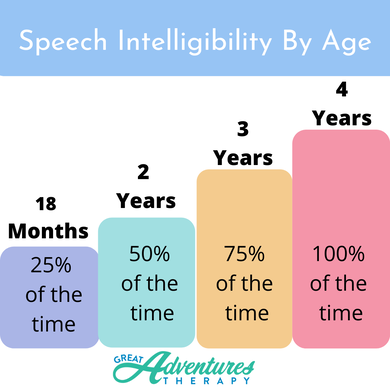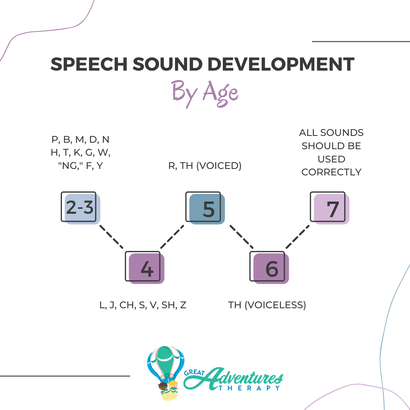|
As soon as we become parents, we are hard-wired to notice everything our child does. Every sound, every smile, every movement, every “first” - we notice it all! So it’s not unusual for parents to also become concerned if their child is showing difficulty with a particular skill, or if that skill is not developing as quickly as they feel it should. So how do I know if my child’s speech sounds are delayed? Let me share some ways that Speech Language Pathologists (SLPs) monitor speech sounds for delays. Speech Intelligibility Parents often understand most of what their child says, as they have listened to their speech develop over time and have a way to anticipate their wants and needs. As SLPs, we are interested in speech intelligibility, or “how well the child can be understood by other listeners.” Here is a quick chart to show you how intelligible your child’s speech should be by age: Ultimately, a stranger should understand most of what your child says by the age of three years old, and all of what they say by the age of four. If your child speaks to other adults and they have a hard time understanding what they are saying, it may be time to find a speech pathologist to evaluate their speech and provide guidance on next steps. Individual Sounds By Age Many SLPs use a developmental sound chart to help guide us on which sounds may be delayed for a child based on their age. The chart looks something like this: While this is never used as an "end-all-be-all" rule, it’s nice to have the guideline to see what sounds a child has developed and which ones may be developing and/or missing from their inventory. Presence of Multiple Speech Sound Errors Even if a child has numerous errors that are developmental for their age, increased errors drastically decrease their ability to be understood by others, and we don’t want to wait for them to develop. It’s best to go ahead and begin treatment. Social-Emotional Impact Having noticeable speech errors can cause a child to have anxiety talking to others or shy away from social activities. They may become frustrated with having to constantly repeat themselves or self-conscious about how their speech sounds to others their own age. If you notice these feelings, discuss them with your child and seek assistance from a speech pathologist in your area.
There is not a perfect age or time to start speech therapy, but it’s best to not wait! If you have any concerns, please reach out for assistance from a licensed professional and they can guide you through what options may be best for your child. If you are in the Knoxville area, give us a call at (865) 236-0103 for a free consultation. We’d love to meet you!
0 Comments
|
AuthorChariti is a licensed/certified Speech Language Pathologist in Knoxville, Tennessee and owner of Great Adventures Therapy. LLC. Archives
December 2022
Categories |
9000 Executive Park Drive Suite #A205
Knoxville, TN 37923
Phone: (865) 236-0103
Fax: (865) 674-5447
[email protected]
Knoxville, TN 37923
Phone: (865) 236-0103
Fax: (865) 674-5447
[email protected]



 RSS Feed
RSS Feed
